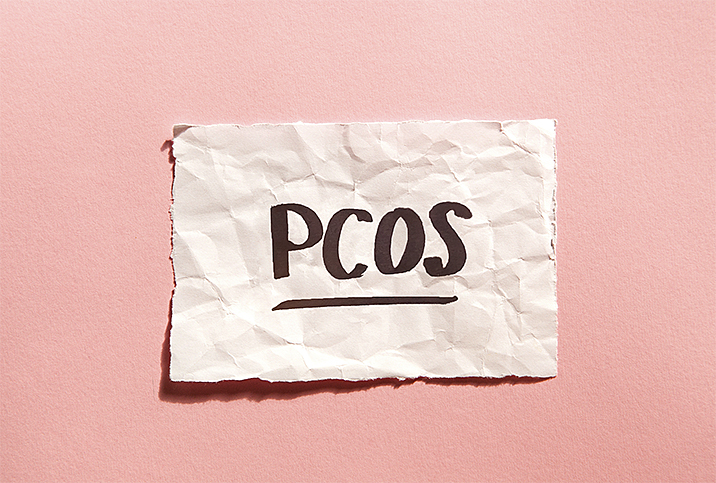How PCOS Impacts Sleep

Polycystic ovary syndrome (PCOS) is a hormonal disorder with complex implications for reproductive, psychological and metabolic health. Between 5 and 10 percent of women of childbearing age have PCOS. The presence of polycystic ovary syndrome often includes a variety of symptoms, including irregular and often heavy, painful periods, acne, weight gain, excess hair growth, infertility, high blood pressure and diabetes.
However, another side effect that often accompanies PCOS is sleep disturbance. A study published in May 2021 by the Journal of the Endocrine Society indicated that people with more severe presentations of polycystic ovary syndrome may be more likely to experience altered melatonin production. Melatonin is a hormone that helps regulate sleep.
According to experts, there can be many reasons for this skewed relationship, and many ways to counteract it.
Progesterone deficiency
Lower levels of progesterone and an increase in estrogen and androgen often characterize PCOS. Progesterone is a hormone that helps regulate the menstrual cycle and prepares the body for pregnancy. Lower levels of progesterone can cause menstrual cycle irregularity, depression and anxiety, and difficulty falling and staying asleep.
Tara Scott, M.D., an OB-GYN in Akron, Ohio, said patients with PCOS often suffer from sleep disturbances and insomnia due to a lack of progesterone in the body; the hormone is released after ovulation, which is affected by PCOS.
"Progesterone helps sleep by binding to the GABA receptor, which makes us tired," Scott said.
Amy Beckley, Ph.D., the CEO and founder of MFB Fertility and inventor of Proov, an at-home, rapid-response urine progesterone test, said lowered progesterone found in people with PCOS can cause a condition called estrogen dominance.
"Estrogen dominance can lead to night sweats and hot flashes, which can keep women awake at night," Beckley said.
Obstructive sleep apnea
Obstructive sleep apnea (OSA) is a serious sleep disorder that causes breathing to repeatedly stop and start during sleep. OSA is common among people with PCOS, with some studies indicating polycystic ovary syndrome patients are twice as likely to have it than people unafflicted.
Obstructive sleep apnea is often associated with obesity; however, some research shows the association between PCOS and OSA remains even when obesity is controlled for.
Insulin resistance
One major side effect of PCOS is insulin resistance, which increases blood sugar in the body. There is significant evidence demonstrating the relationship between sleep disturbances and insulin resistance, with many studies purporting that sleep disorders can exacerbate insulin resistance, and vice versa.
A 2001 study conducted on women with and without PCOS indicated insulin resistance was the strongest risk factor for sleep apnea, even when controlling for age, BMI and testosterone levels. Another study in 2005 found people with polycystic ovary syndrome who had higher insulin levels also had an elevated risk of OSA.
So why does insulin resistance lead to sleep disturbance? Researchers aren't exactly sure. However, studies have demonstrated insulin increases sympathetic outflow (increased heart rate, for example), which could increase the risk of obstructive sleep apnea and daytime sleepiness.
Additionally, insulin resistance is a risk factor for obesity, another factor associated with PCOS, which can increase the likelihood of sleep disturbances such as sleep apnea and restless leg syndrome.
Anxiety and depression
Anxiety and depression are often associated with sleep disorders and insomnia, and are also common in people diagnosed with polycystic ovary syndrome.
In a clinical sample of women with PCOS, those with a history of depression had a threefold increase in disturbed sleep.
How to manage sleep disturbances
Scott said people with PCOS who face difficulties sleeping should see an integrated gynecologist or a hormone specialist to "target the actual problem and not just the symptoms."
Medication targeting insulin resistance is also helpful in reducing PCOS symptoms and thus aids with sleep. Metformin, a diabetes medication, can help treat insulin resistance. Treating insulin resistance means a decreased risk of OSA and other sleep disturbances that affect sleep quality. However, Scott warns metformin can be hard on the gut, so lifestyle changes may be preferable.
Diet and exercise
Diet is another important factor that can aid with sleep in those with PCOS. Scott recommends individuals with polycystic ovary syndrome try a modified Paleo diet low in carbs, as higher-carb diets can contribute to increased insulin resistance.
Exercise has been shown to help improve sleep and can help improve symptoms related to anxiety and depression. Experts recommend engaging in 150 minutes of moderate aerobic exercise a week.
Sleep hygiene
Practicing a robust sleep routine and maintaining sleep hygiene is important for anyone with PCOS who suffers from insomnia or related conditions.
Leigha Saunders, N.D., is a Canadian naturopathic sleep specialist. She recommends limiting blue light one to two hours before bedtime by unplugging blue-light-emitting devices and by using blue-light-blocking glasses. She also advises limiting caffeine 12 hours before your ideal bedtime, as it takes 12 hours to fully metabolize, and limiting alcohol at least three hours beforehand.
"While it's tempting to reach for a glass of wine to help you unwind and decompress from your day, alcohol is a strong inhibitor of REM sleep," Saunders said. "Choose the sleepy tea instead."
Going forward
If you are diagnosed with PCOS and are having difficulty sleeping, seek medical care and advice from your family practitioner or OB-GYN for steps to take on how to best manage your condition and sleep-related issues. For more information on sleep hygiene and sleep-related issues, consider booking an appointment with a specialist.
















